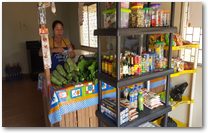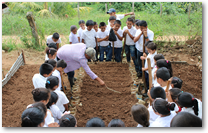

| Sustainable Agriculture | Hunger | Gardening | Poultry | Pork | Trade Store | Community Gardens | School Lunch |
Sustainable Agriculture
Fellow Man International combats disease caused by malnutrition by feeding the hungry, teaching people how to feed themselves through sustainable agriculture, offering technical support and providing community services to establish satelite agriculture projects throughout our service area. Fellow Man International is committed to improving health and well-being through the elimination of hunger.
Hunger
Hunger and malnutrition are complex problems for the Honduran people. Children and pregnant women are the most vulnerable. Their diets are mostly comprised of beans, rice and tortillas. Most of the people who visit the Fellow Man International mission depend on work in coffee fields to survive. During non-harvest months, many families do not eat every day. The children's diets lack quantity as well as quality of foodstuffs. Insufficient caloric intake, protein and vitamin/mineral difficiencies all play huge roles in disease processes such as anemia, suppressed immune systems and the various mal-nutritive states of Marasmus and Kwashiorkor. Also complicating matters are the difficulties of proper food preparation due to contaminated water and lack of refrigeration. Furthermore, there are additional health and nutritional issues brought about by frequent parasitic infestation.
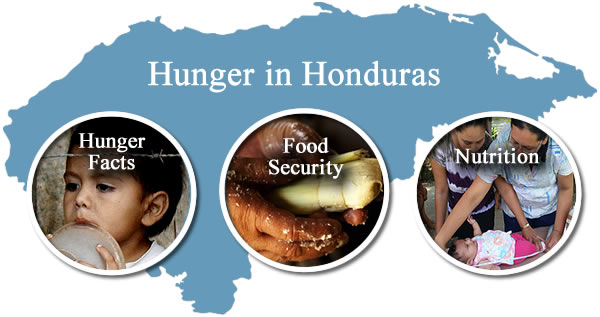
Gardening
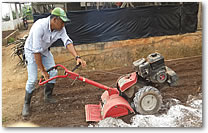 Many fruits and vegetables are grown in the project's gardens. A portion of the produce is given to grade schools to support the school lunch program while the remaining produce is given to families suffering from malnutrition and for trade or purchase through the FMI trade store.
Many fruits and vegetables are grown in the project's gardens. A portion of the produce is given to grade schools to support the school lunch program while the remaining produce is given to families suffering from malnutrition and for trade or purchase through the FMI trade store.
A variety of cultivation methods are used to maximize production, all of which are techniques which can be reproduced by local villagers. Waste from the project's chickens and hogs is composted with other organic materials such as coffee pulp to provide an organic solution to soil nutrient deficiencies. Tomatoes, green peppers, cucumbers, squash and radishes are among some of the vegetables produced by the project. Seeds, starter plants and technical support are provided to those who wish to start their own gardens.
One might ask why the poor have not been raising their food all along. There are many reasons why some of the Honduran people abandoned cultivation. Some of the reasons are because of a fundamental shift which occured when the barter and trade system was replaced by a cash system. Other reasons are related to poor soil quality, insects and other pests in addition to lack of technical services and basic supplies. One of our key strategies to combat malnutrition is through education and the promotion of cultivation.
Poultry
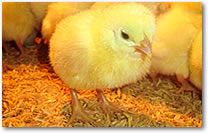 Protein is one of the most frequently missing dietary components. The poor are forced to omit protein from their diets because it is cost prohibitive. The agriculture project produces over one hundred and fifty, 3.5 lb to 4.0 lb chickens every three weeks to help feed the hungry and to support the school lunch program.
Protein is one of the most frequently missing dietary components. The poor are forced to omit protein from their diets because it is cost prohibitive. The agriculture project produces over one hundred and fifty, 3.5 lb to 4.0 lb chickens every three weeks to help feed the hungry and to support the school lunch program.
The agriculture project also has more than one hundred laying hens which provide eggs for the school children and villagers. The cost of eggs continues to rise as the cost of feed has increased due to rising fuel prices associated with the production of basic grains. One dozen eggs costs more than three U.S. dollars which is nearly a half day's wage for most working adults. FMI encourages and assists families to keep their own backyard flocks of laying hens through technical support and at times by providing live animals.
Pork
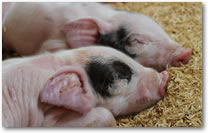 Pork is an expensive meat to produce. Most people living in the FMI service area do not eat meat more than one or twice a month. A limited amount of pork is produced by the agriculture project to provide meat to the grade school lunch programs and is offered for trade or sale through the FMI trade sstore. One reason for raising pigs is to demonstrate the value of penning livestock. Trichinosis is a prevalent health problem, therefore residents of this area are encouraged to pen their pigs to avoid exposure to such harmful parasites.
Pork is an expensive meat to produce. Most people living in the FMI service area do not eat meat more than one or twice a month. A limited amount of pork is produced by the agriculture project to provide meat to the grade school lunch programs and is offered for trade or sale through the FMI trade sstore. One reason for raising pigs is to demonstrate the value of penning livestock. Trichinosis is a prevalent health problem, therefore residents of this area are encouraged to pen their pigs to avoid exposure to such harmful parasites.
Nothing is wasted at the FMI agriculture project. Chicken waste is fed to the hogs and used as an organic fertilizer. Waste produced by the hogs is also composted and used as fertilizer. The agriculture staff butcher all of the animals produced on-site. When animals are processed to harvest their meat and organs, again, nothing is wasted. Chicken foot soup is one of the school children's favorite meals. "Head cheese" is a delicacy and special treat for families. Many people pre-order the hogs' feet and tails. The hogs' skin is removed in thin strips and fried to make pork rinds or "chicharrones" while the fat is rendered for lard.
Trade Store
Felow Man International has a trade store on-site, which assists people to obtain high quality milk products and protein in exchange for other food items, helping to conserve the families' limited cash resources. The project's grocery store also sells basic necessities at only ten percent above cost, eliminating the need for expensive travel to the valley below.
People are encouraged and provided technical assistance to cultivate fruits and vegetables on their own small plots of land. They are able to trade whatever excess they might have for meat, eggs and milk products such as butter, cheese and whole milk. Fellow Man International partners with distributors of basic grains such as beans, rice and corn and other required food items to help poor families feed themselves. Also, FMI works closely with fresh produce vendors in San Pedro Sula who purchase any excess products which generates cash income to support the agriculture project self-sufficiency.
Community Gardens
Community gardens and small animal husbandry projects are a wonderful way to teach people how to grow their own food while at the same time creating a sense of unity as villages face the problem of hunger. Fellow Man International works with village leaders, teachers and church officials to establish satelite agriculture projects to help combat hunger and malnutrition. Agriculture committees are organized with the help of city councils and volunteers to tend to the gardens and animals with technical, material and live animal support from FMI.
The Fellow Man International agriculture staff travel to the villages where satelite agriculture projects frequently. Each project is established based on need and the incidence of malnutrition among school-aged children. Most garden produce and animal meat is used to feed the village school children through the FMI hot lunch program. Excess produce is distributed to those families struggling with hunger, fragile individuals within the community such as the elderly and pregnant women and to families of the project volunteers. Some communities have even chosen to sell excess produce to help grow and expand their projects.
School Lunch
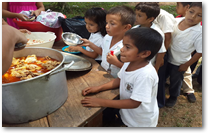 Providing school lunch is one of the most important things Fellow Man International can do to combat hunger and poverty in the mission's service area. Every year, the FMI physicians travel to every village to evaluate the children's nutritional status. After the results have been evaluated, priority is placed on those villages which have the highest incidence of malnutrition. School lunches have many well-documented benefits for children living in developing nations.
Providing school lunch is one of the most important things Fellow Man International can do to combat hunger and poverty in the mission's service area. Every year, the FMI physicians travel to every village to evaluate the children's nutritional status. After the results have been evaluated, priority is placed on those villages which have the highest incidence of malnutrition. School lunches have many well-documented benefits for children living in developing nations.
Perhaps the most important benefit of a school lunch program is the assurance that children from the most impoverished homes are guaranteed at least one hot meal, five days per week. In Honduras, many children may not have anything to eat for more thant twenty-four hours at a time. School lunches ensure the most vulnerable of children have a stable source from which to get the food their growing bodies and developing minds need. Another benefit to hot school lunches is the increase enrollment of school-aged children. Parents appreciate knowing their children will be fed, even in those moments when perhaps their own cupboards are bare. School lunch programs provide incentives to parents to send their children to school because it helps with the family budget. Fellow Man International is proud to support literacy and combat hunger and malnutrition through the school lunch program. It is our goal to establish community agriculture projects and school lunch programs in every village within the FMI service area.
